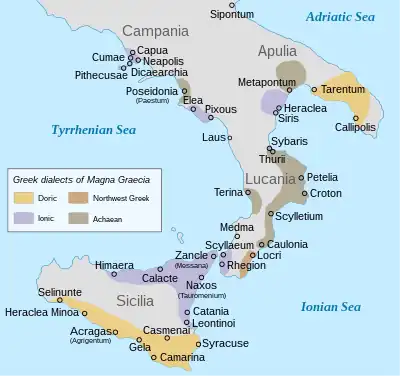Συράκουσαι
Ancient Greek

Συράκουσαι (Surā́kousai) Syracuse was the most powerful Doric Greek settlement in Magna Graecia, and among the largest of the Ancient Greek world. Syracuse played a major role in the Peloponnesian War. From 415-413 BC, archrival Athens launched a massive Sicilian Expedition campaign to attack Syracuse; a series of battles between the two great city-states resulted in a decisive victory for the Syracusans and a crushing defeat for the Athenians, who never fully recovered.
Alternative forms
Etymology
Found as far back as 8th century BC; from a Pre-Greek word, possibly Phoenician 𐤔𐤄𐤓𐤀𐤇 (šhrʾḥ, “to feel ill”), a reference to the port being near a swamp.
Pronunciation
- (5th BCE Attic) IPA(key): /sy.rǎː.kuː.sai̯/
- (1st CE Egyptian) IPA(key): /syˈra.ku.sɛ/
- (4th CE Koine) IPA(key): /syˈra.ku.sɛ/
- (10th CE Byzantine) IPA(key): /syˈra.ku.se/
- (15th CE Constantinopolitan) IPA(key): /siˈra.ku.se/
Inflection
| Case / # | Plural | ||||||||||||
|---|---|---|---|---|---|---|---|---|---|---|---|---|---|
| Nominative | αἱ Σῠρᾱ́κουσαι hai Surā́kousai | ||||||||||||
| Genitive | τῶν Σῠρᾱκουσῶν tôn Surākousôn | ||||||||||||
| Dative | ταῖς Σῠρᾱκούσαις taîs Surākoúsais | ||||||||||||
| Accusative | τᾱ̀ς Σῠρᾱκούσᾱς tā̀s Surākoúsās | ||||||||||||
| Vocative | Σῠρᾱ́κουσαι Surā́kousai | ||||||||||||
| Notes: |
| ||||||||||||
Derived terms
- Συρακοσεύς (Surakoseús)
- Συρακοσία (Surakosía)
- Συρακόσιος (Surakósios)
- Συρακόσσιος (Surakóssios)
- Συρακοσσίς (Surakossís)
Descendants
References
- “Συράκουσαι”, in Liddell & Scott (1940) A Greek–English Lexicon, Oxford: Clarendon Press
- Bauer, Walter et al. (2001) A Greek–English Lexicon of the New Testament and Other Early Christian Literature, Third edition, Chicago: University of Chicago Press
- G4946 in Strong, James (1979) Strong’s Exhaustive Concordance to the Bible
- Woodhouse, S. C. (1910) English–Greek Dictionary: A Vocabulary of the Attic Language, London: Routledge & Kegan Paul Limited, page 1,026
- Nestle, Eberhard; Aland, Kurt; et al. (2012) Novum Testamentum Graece, 28th revised edition, 4th corrected printing edition, Stuttgart: Stuttgart Deutsche Bibelgesellschaft, →ISBN
This article is issued from Wiktionary. The text is licensed under Creative Commons - Attribution - Sharealike. Additional terms may apply for the media files.